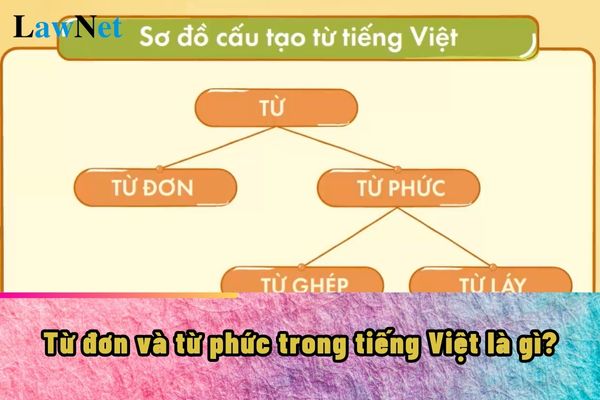What are simple words and compound words in Vietnamese? When do students in Vietnam learn about simple words and compound words in the Vietnamese Language curriculum?
What are simple words and compound words in Vietnamese?
*Simple and Compound Words in Vietnamese
Simple Words
Definition: Simple words comprise only one syllable.
Examples: mẹ (mother), cha (father), nhà (house), cây (tree), hoa (flower), đi (go), đến (arrive), ăn (eat), uống (drink)...
Characteristics:
The meaning of simple words is generally quite straightforward and intuitive.
They cannot be divided into smaller meaningful units.
Compound Words
Definition: Compound words are formed by two or more syllables.
Examples: nhà cửa (home), sách vở (books), xe đạp (bicycle), đi học (go to school), ăn cơm (eat rice)...
Characteristics:
The meaning of compound words is often more complex than simple words, possibly encompassing multiple meanings.
They can be divided into smaller syllables, each of which may have an independent meaning or no meaning when standing alone.
Classification of Simple and Compound Words in Vietnamese
Compound Words: These are compound words where the constituent syllables all have meaning.
Coordinative Compounds: The syllables have equal roles. (Examples: nhà cửa, sách vở)
Subordinative Compounds: One primary syllable and one auxiliary syllable. (Examples: xe đạp, đi học)
Reduplicative Words: These are compound words where the syllables repeat entirely or partially, creating nuances of sound and meaning.
Full Reduplication: Entire syllables are repeated. (Examples: lung linh, xinh xinh)
Partial Reduplication: Part of the syllables is repeated. (Examples: đo đỏ, xanh xanh)
*Note: The information is for reference purposes only./.

What are simple words and compound words in Vietnamese? When do students in Vietnam learn about simple words and compound words in the Vietnamese Language curriculum? (Image sourced from the Internet)
When do students in Vietnam learn about simple words and compound words in the Vietnamese Language curriculum?
According to Section V of the Appendix of the General Education Program for Literature issued with Circular 32/2018/TT-BGDDT, the requirements for grade 6 Literature must include:
KNOWLEDGE OF VIETNAMESE
1.1. Simple and compound words, compound words and reduplicative words
1.2. Polysemous words and homonyms
1.3. Meaning of some common idioms
1.4. Meaning of some common Sino-Vietnamese elements (e.g., bất, phi) and the meaning of words containing those Sino-Vietnamese elements (e.g., bất công, bất đồng, phi nghĩa, phi lí)
2.1. Main sentence components: expanding the main sentence elements with phrases
2.2. Adverbial clauses: characteristics, role in linking sentences
2.3. Use of semicolons (to mark the boundaries between components in a complex list); quotation marks (to mark understanding of a word not in its usual sense)
3.1. Poetic devices of metaphor and metonymy: characteristics and effects
3.2. Paragraphs and texts: characteristics and functions
3.3. Selecting words and sentence structures suitable for conveying the meaning of texts
3.4. Text types and genres
- Narrative texts: essays narrating personal experiences, essays recounting a folk tale
- Descriptive texts: essays describing a scene of activity
- Expressive texts: six-eight poetry; paragraphs capturing emotions when reading a six-eight poem
- Argumentative texts: opinions, reasons, evidence; essays presenting opinions on a phenomenon in study or life
- Informational texts: headline, subheading, heading, bold text, numbering and bullet points; explanatory text reporting an event; minutes recording an incident or a meeting, discussion
4.1. Language development: borrowing words, using borrowed words
4.2. Non-verbal communication means: images, statistics
Thus, students will learn about simple and compound words in the Grade 6 Vietnamese program.
What materials are used in the Grade 6 Literature curriculum in Vietnam?
Based on Subsection 2 Section 5 of the General Education Program for Literature issued with Circular 32/2018/TT-BGDDT, the materials used in the Literature curriculum for Grade 6 students include:
(1) Literary texts
- Legends, fairy tales, fables, short stories
- Poetry, six-eight poetry
- Memoirs or travelogues
(2) Argumentative texts
- Social argumentative essays
- Literary argumentative essays
(3) Informational texts
- Texts recounting an event
- Minutes of meetings
- Summary charts
>>> Download General Education Program for Vietnamese Literature
What are regulations on the periodic assessment of Grade 6 students in Vietnam?
According to the regulations in Article 7 of Circular 22/2021/TT-BGDDT regarding periodic assessment forms for lower secondary school students:
- Periodic assessment (not applicable to thematic clusters), including mid-term and end-term assessments, is conducted through tests (paper or computer-based), practical assignments, and learning projects.
+ The duration for a paper or computer-based test for subjects (excluding thematic clusters) with up to 70 periods per academic year is 45 minutes, and for subjects with more than 70 periods per academic year is from 60 to 90 minutes; for specialized subjects, a maximum of 120 minutes.
+ For paper or computer-based tests assessed by scores, the test design is based on a matrix, specification, and the standards required by the subject as stipulated in the General Education Program.
+ For paper or computer-based tests assessed by comments, practical assignments, learning projects, there must be guidelines and assessment criteria according to the standards required by the subject as stipulated in the General Education Program before implementation.
- In each semester, each subject assessed by comments has one mid-term and one end-term evaluation.
- In each semester, each subject assessed by a combination of comments and scores has one mid-term score (abbreviated as DDGgk) and one end-term score (abbreviated as DDGck).
- Students who do not participate in the required number of tests, assessments due to force majeure reasons can make up for the tests or assessments with equivalent requirements for the missing evaluation. The make-up assessments take place within the respective semester.
- If students do not participate in the make-up tests or assessments, they will be evaluated at the "Not Achieved" level or receive a zero (0) score for the missing test or evaluation occasion.

